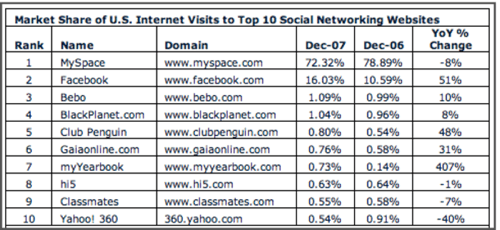While the media and Silicon Valley have lost our collective minds over the rise of Facebook over the past year, traffic analysts Hitwise released numbers today indicating that things are not as they might seem. Apparently, all the Facebook hype has not translated into a huge growth in social network market share among US users. Hitwise says that Myspace received 72.32% of US visits to the top ten social networks in December 2007, while Facebook received just over 16%.

How about year over year growth? Facebook had 10.59% marketshare in December 2006, Hitwise says. Myspace dropped from nearly 79%. It appears that social networking has grown in general; though Facebook posts impressive numbers of new users, in terms of sheer visits Myspace is nearly keeping up with its growth.
Other Networks Growing Too
If we assume that Facebook is growing rapidly then the relatively similar marketshare numbers year over year indicate it’s actually the entire sector that’s growing. Though trailing in the distance of the big two, market share percentages have held steady or grown for the next services in line as well: Bebo, BlackPlanet, ClubPenguin, GaiaOnline, MyYearbook and Hi5 have unchanged or increased marketshare numbers according to the same metric.
Chart from Hitwise

The Hype
Tech bloggers write about Facebook all the time, I feel like every coffee shop I visit is filled with laptops open to Facebook and Richard MacManus (in transit to the US as we speak) says he just saw a whole magazine about Facebook in the airport. CEO Mark Zuckerberg was on 60 Minutes last weekend, interviewed by a reporter who marveled at the most basic social networking functionality.
The Facebook platform, valuation and scandals have all caught the imagination of much of the press. Many of our readers, however, are less thrilled with the direction Facebook is going. Two of our most popular posts of late were an interview with a disgruntled early Facebook user and our coverage of the just released Facebook feature that lets users hide the overhyped applications in their profile!
Tom’s Still Got Friends
Meanwhile, millions and millions of people are still happily logging into MySpace to communicate with their friends. I spent some time on MySpace last night, exploring the profile pages of family and friends and was shocked to see that all the music players on the site are now sponsored by Zune. It was news to me but I’m told it’s been that way for weeks. I haven’t been able to find a single shred of coverage of that deal on any of the top tech blogs – but I would assume it’s helping sell more Zunes than ever.
Numbers like those from Hitwise always need a grain of salt, but the next time someone tells you “by this time next year, everything you invest in will be built on top of Facebook,” (as Tribe.net founder Mark Pincus reportedly told Fred Wilson last year) – you just send them over here to this post and then see what they say.
Facebook is interesting but Myspace is where the users are, still.
Is Classism Part of this Story?
It’s entirely possible that people actually know about this already, but that the technocratic classes are excited as they (we) are about Facebook for another reason. Money. It’s been documented and is generally understood that Facebook users tend to come from wealthier demographics that are more invested in the high-end economy than are Myspace users.
There has certainly been a lot of innovation at Facebook, and that innovation is more accessible to developers than the still-forthcoming Myspace Platform, but how much of this excitement about Facebook is really grounded in the perception that it’s the Junior LinkedIn – the path to yuppie pockets. If people mock niche social networks aimed explicitly at wealthy or upwardly mobile people – why is it more polite to focus on a social network widely understood as yuppie-focused (Facebook) as the future of everything important on the internet? How often does the press pay attention to BlackPlanet.com? Not very often, as far as I can tell.










